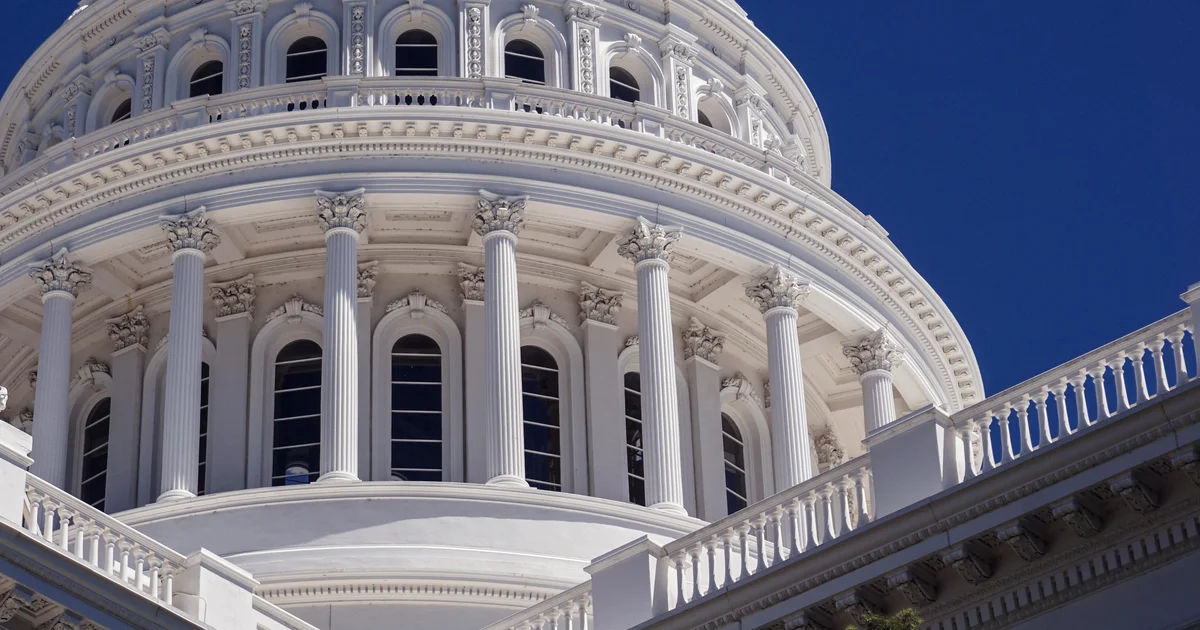Copyright CBS News

Gov. Gavin Newsom signed hundreds of bills into law this year, taking action on legislation sent to his desk by state lawmakers aimed at addressing some of California's most pressing issues, such as immigration, wildfire recovery and insurance. Here's what to know about California's new laws and how they could affect you. Most law enforcement officers to be barred from wearing masks on duty In September, Newsom signed several bills while visiting Los Angeles, all of which were aimed at enhancing protections for residents affected by ongoing immigration enforcement operations. Among the legislation was Senate Bill 627, called the "No Secret Police Act," which prohibits most local, state and federal law enforcement officers from wearing face coverings while on duty. It also calls for all officers to be identifiable by name and badge number. Protections for students during immigration enforcement operations A pair of bills, Assembly Bill 49 and Senate Bill 98, provide protections for students amid immigration enforcement operations conducted at schools. AB 49 prohibits school officials and employees from allowing federal agents conducting immigration enforcement to enter school sites without a warrant, court order or judicial subpoena. SB 98 requires schools to notify parents, teachers, administrators and school personnel of the confirmed presence of immigration enforcement agents and activity on school campuses. Support for wildfire rebuilding efforts Newsom signed a package of bills on Oct. 10 that he said will "support the ongoing rebuilding and recovery efforts in Los Angeles after the devastating fires earlier this year." The legislation signed by Newsom aims to protect homeowners and tenants following a disaster; provide property tax relief for survivors; help workers recover; make insurance work more efficiently for property owners and small business owners; crack down on looting and fire responder impersonation; and reduce further risk of catastrophic wildfire. The bipartisan package will also provide additional resources for the state's response and recovery for future disasters. Signed bills include: Assembly Bill 238, which offers mortgage forbearance to people affected by the Palisades and Eaton fires for up to 12 months. AB 299, which allows displaced people to stay at hotels, motels or short-term rentals for up to 270 days without being considered tenants. AB 245, which extends the amount of time that Palisades, Eaton, Hurst, Lidia, Sunset and Woodley fire victims can rebuild their homes without property tax increases by three years. Senate Bill 495, which requires insurers to, in the event of a covered total home loss, offer 60% of the personal property policy coverage limit, up to $350,000, without an itemized claim from the policyholder. AB 888 establishes the California Safe Homes grant program, which will provide grants to low-income homeowners to help them build fire-safe roofs for their homes and fund defensible space vegetation clearing projects. New Glock gun sales will be barred in California The sale of new Glock handguns will stop in California under Assembly Bill 1127, but the guns won't be illegal to possess or to purchase used. The legislation was aimed at addressing the use of "Glock switches," which were already banned in the state but are now easily accessible through 3-D printing. The small switches enable the guns to be modified into fully automatic weapons. AB 1127 was passed by the California Legislature on a party-line vote, with all Republican assembly members in opposition. Insulin prices to be capped at $35 Co-pays on insulin in California will be capped at $35 for 30-day supplies after Newsom signed Senate Bill 40. According to the bill, about 263,000 Californians have type 1 diabetes and rely on daily doses of insulin. Many of the 4 million Californians with type 2 diabetes also need the doses. About one-in-four insulin users have reported underusage due to the high costs. "California didn't wait for the pharmaceutical industry to do the right thing — we took matters into our own hands," Newsom said in a statement Thursday. "By beginning the process to manufacture our own insulin and pricing it at a maximum cost of $11 a pen in a five-pack, California and Civica are showing the nation what it looks like to put people over profits." The CalRX, which is the state's program to develop and sell its own prescription medications, will be able to sell the low-cost pens beginning on Jan. 1, 2026. Protecting pets, including new regulations on sellers Four bills signed in October are aimed at cracking down on puppy mills and protecting dogs and cats alike. Three of the bills, AB 506, AB 519 and SB 312, implement new regulations aimed at holding pet sellers accountable by prohibiting third-party pet brokers and requiring dog importers to submit health certificates to the California Department of Food and Agriculture shortly after shipping a pet. AB 867 bans declawing cats when not medically necessary. "Greater transparency in pet purchases will bring to light abusive practices that take advantage of pets in order to exploit hopeful pet owners," Newsom said in a statement. Criminalizing threats against schools, places of worship, hospitals and workplaces Senate Bill 19 makes it a crime to threaten daycares, schools, universities, workplaces, houses of worship or medical facilities. The new law amends existing California law that criminalizes credible threats, clarifying that threats to those facilities are criminal even if a specific person isn't identified. Barring loud advertisements Senate Bill 576 prohibits streaming services from increasing the volume of commercials above the level of a television show or movie that someone is watching. Federal law already bans broadcasters from running overly loud commercials, but streaming services were not around when the federal Commercial Advertisement Loudness Mitigation Act was passed in 2010. New state artificial intelligence regulations Senate Bill 53 targets large artificial intelligence models and implements a number of transparency, reporting and safety requirements that developers must follow in the state. "California has proven that we can establish regulations to protect our communities while also ensuring that the growing AI industry continues to thrive," Newsom said in a statement after signing the first-in-the-nation bill. Online safety protections for children Newsom also signed a package of legislation aimed at protecting children online. New laws include creating protocols for AI chatbots to identify suicidal tendencies in users and requiring companies to clarify that their AI companions are not health care professionals. App stores and operating systems must now require age verification for users on products deemed "inappropriate" or "dangerous." Under new California law, third parties that knowingly generate or distribute "deepfake" pornography may now be held liable in civil court. Assembly Bill 56 requires warning labels for social media platforms in an effort to warn young users about the downsides of extended usage of those sites. Privacy and data control for social media users Assembly Bill 656 forces social media companies to make it straightforward and simple for users to delete their accounts. Account cancellations will also delete all personal data from the site's database. Allowing more housing construction near transit In an effort to help address California's high housing costs, Newsom signed Senate Bill 79, which allows for more housing construction near major transit stations. Proponents of the bill say that the legislation will also help increase ridership, reduce traffic and pollution, and expand access to jobs and schools. "For too long, California has poured billions into transit without building the housing density needed for those systems to reach their potential," Newsom said. A ban on ultra-processed food in school lunches Assembly Bill 1264 makes California the first state in the nation to ban ultra-processed food from public school lunches. Limits on sugars, fats and calories in food items will go into place, as well as bans on certain dyes, including Red 40. "For too many students, the meals they receive at school are the only ones they can count on in a day, which makes the quality of that food all the more important," First Partner Jennifer Siebel Newsom said. "By removing the most concerning ultra-processed foods, we're helping children stay nourished, focused, and ready to learn." Establishing a reparations agency Senate Bill 518 moves California one step closer toward issuing reparations to descendants of enslaved persons. The law establishes the Bureau for Descendants of American Slavery, which is eligible to receive state and federal funding within the Civil Rights Department. The bill states that the bureau's Genealogy Division would then "verify an individual's status as a descendant." While the law stops short of authorizing the bureau to hand out cash reparations, the state is still searching for ways to "Address the lasting harms of disenfranchisement, segregation, discrimination, exclusion neglect, and violence impacting both descendants and communities," according to the bill's text. Reducing the cost of living for families A 19-part package of bipartisan legislation aimed at reducing costs and protecting families by creating stronger consumer protections. Signed bills include: Assembly Bill 578, which makes it easier for people to access refunds when a food delivery platform fails to deliver. AB 325, which makes pricing algorithms subject to state antitrust law to protect consumers from price increases and "false scarcity generated through unlawful collusion," the governor's office said. AB 1327, which protects homeowners by allowing them to cancel a contract for home improvement and home solicitation by phone or email. Senate Bill 766, which seeks to add transparency to the vehicle-buying process in California by strengthening consumer protection laws and preventing car retailers from tacking on add-on services and features that don't benefit the buyer. AB 1374, which will look to improve the process for renting a car online by increasing the transparency on pricing and whether someone is renting a gas-powered or electric vehicle. SB 362, which requires financing providers to provide small business owners with accurate information. SB 825, which strengthens the authority of the Department of Financial Protection and Innovation and allows them to "go after bad actors in financial services," Newsom's office said. Several of the other bills attached to the package specifically aim to protect tenants, including: AB 628, which requires that rental units include a working stove and refrigerator to be deemed habitable, beginning with leases entered into starting in 2026. AB 246, which protects tenants from eviction if there are delays or reductions in Social Security benefits that affect their rent payments. AB 391, which allows mobile home parks to deliver notices electronically with resident consent. AB 414, which lets landlords return a tenant's security deposit electronically if the tenant chooses that option. AB 806, which prevents mobile home parks from prohibiting the use or installation of air conditioning units by tenants AB 863, which directs the Judicial Council to create a single multilingual eviction summons form to improve language access for tenants. Allowing rideshare drivers to unionize Assembly Bill 1340 allows rideshare drivers with services including Lyft and Uber to form a union and negotiate a contract while still being labeled as independent contractors. It requires the app-based companies to negotiate with union members in good faith. Protecting against election interference Proponents of Senate Bill 42 and Senate Bill 398 say the legislation is aimed at protecting California elections against interference from what Newsom called a "sweepstakes from billionaires seeking to buy elections." SB 42 puts a measure on the Nov. 2026 ballot to repeal the ban on public financing of elections, extending to all California cities and counties the ability to create publicly financed election programs. Proponents say that it will level the playing field for candidates and reduce the ability to "buy elections," according to the governor's office. SB 398 criminalizes offering payments or valuables to incentivize voters. The crime would be punishable by imprisonment, a fine, or both. Legislators say that the laws will protect the integrity of the state's election process by ensuring that voters' interests remain at the center of democracy, outlawing the act of offering someone money or valuables to register to vote, which was not previously a crime. Strengthening California's CARE Act Senate Bill 27 expands the CARE Act, which provides court-ordered services and treatments for those with mental illnesses. The new guidelines force judges to consider CARE Court as a "frontline option" for those convicted of misdemeanors who suffer from mental illness as a way to keep them out of the criminal justice system. Expanded services, resources for California women A legislative package intended to increase the quality of life for California women includes new regulations on products commonly used by women, such as hair and menstrual products and prenatal vitamins. The legislation signed by Newsom also aims to increase access for women to alternative birth centers. "Women in California deserve to have access to quality health care, child care support, and safer products for everyday use," Newsom said. "I'm proud to sign these bills that will continue to address the needs of Californian women and move the needle towards gender equity." Increasing access to mental health resources for LGBTQ+ youth Under Assembly Bill 727, student ID cards at public middle schools, high schools and colleges will be required to display the phone number for The Trevor Project, which provides a 24/7 suicide and crisis hotline for LGBTQ+ youth. This new law expands the state's partnership with The Trevor Project, which has assisted California's own crisis hotline staff with specialized training. Automatic admission to California State University schools for qualifying students Under Senate Bill 640, many students can skip the stress of waiting for an acceptance letter to 16 of the 22 California State University campuses. As long as high school seniors achieve a 2.0 grade point average and take mandatory "a-g" courses, they'll be eligible for admission to the schools under the new law. The participating schools are CSU Bakersfield; CSU Channel Islands; Chico State; CSU Dominguez Hills; Cal State East Bay; Fresno State; Cal Poly Humboldt; Cal State LA; Cal State Monterey Bay; CSU Northridge; Sacramento State; Cal State San Bernardino; San Francisco State; Cal State San Marcos; Sonoma State; and Stanislaus State. Students who want to attend Cal State Fullerton, CSU Long Beach, Cal Poly Maritime Academy, San Diego State, San Jose State and Cal Poly San Luis Obispo are not automatically accepted with these requirements, and must apply using traditional methods. Newsom's notable vetoes



